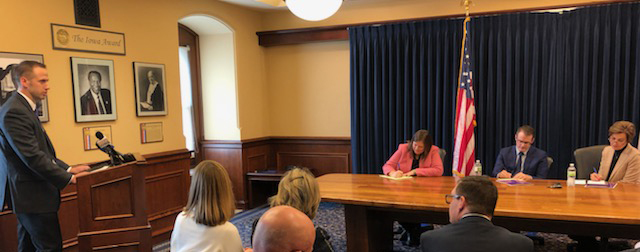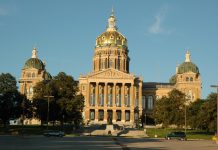Chris Ingstad, president of Iowans for Tax Relief, spoke at a recent public budget hearing hosted by Gov. Kim Reynolds. Iowans for Tax Relief is the leading advocacy group at the Capitol during the legislative session pushing for policies that represent the interest of all Iowa taxpayers.
Ingstad spoke on various issues.
“While those healthy ending balances are nice, they might also be a sign that the state should find an opportunity to return some of that money back to the taxpayer in the form of lower income tax rates,” he said. “A blueprint for that already exists in the future tax cuts that were promised in 2018’s reform. Our members would appreciate seeing those future cuts implemented sooner rather than later.”
According to ITR, under the initial individual income tax cut that reduced the top marginal rate to 8.53 percent, Iowa still has a higher rate than every border state, except for Minnesota. Iowa’s corporate income tax rate is 12 percent, which is also the highest rate among neighboring states.
While progress has been made, it’s been slight. The Tax Foundation rated Iowa 45th worst tax climate in the country in 2018. Iowa improved to 43rd in 2019 and is projected to be 42nd in 2020.
Iowa law allows the state to spend 99 percent of estimated revenue, but Ingstad encourages a little more constraint than that.
“As the work for crafting next year’s budget now begins in earnest, we’d encourage the Governor and the legislature to keep several things in mind,” he said. “The first is that while there are many reasons to be optimistic about the state’s economy, there are also many reasons to exercise caution. Budgeting to spend less than the mandatory 99 percent limit would be helpful in the event that potential economic risks come to fruition.”
One key issue entering 2020 is fixing the occupational licensing headaches in Iowa. The Hawkeye State has one of the lowest unemployment rates in America. Ingstad said it is time Iowa makes entering the job market easier for current and potential residents.
“Occupational licenses protecting the health and well-being of citizens make sense and are practical,” Ingstad said. “But there are reforms taking place across the country that Iowa should consider.”
Ingstad suggested a review of existing licensing requirements, universal recognition for license holders outside of Iowa, a fee waiver for Iowans below a certain income level and criminal justice reforms. He called for a thoughtful path that makes it easier for people to re-enter the workforce after people have paid their dues to society.
Finally, Ingstad discussed regulatory reforms. One of ITR’s members operates her family’s apple orchard. He said nothing is more Iowan than growing and selling food.
“Yet this family is subject to different sets of fees and regulations depending on where they sell those products they grow themselves, whether that be at the store on their farm, out of a food truck or at a farmer’s market,” he said. “It is important for the public to be protected, but too many regulations drive up the cost and complexity of doing business.”
Iowans for Tax Relief is also offering a 2020 issue survey that can be accessed here.











